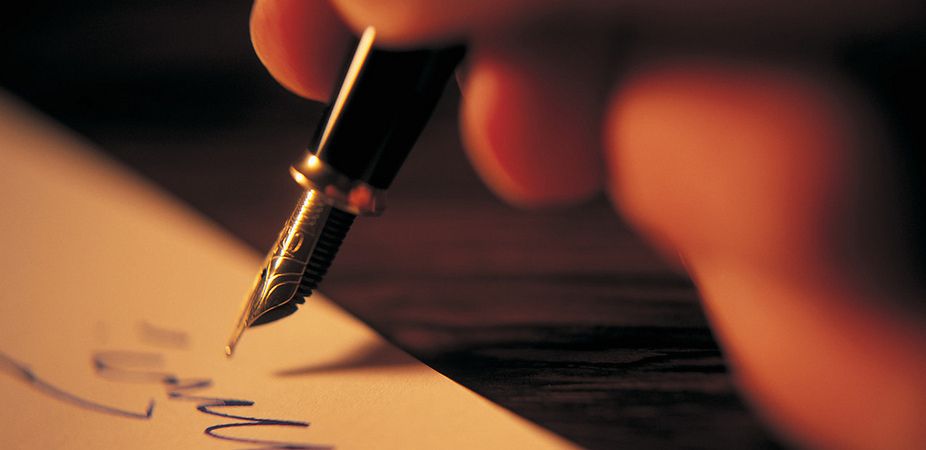
Will People Ever Trust E-Signatures?

Eileen Chou is an assistant professor at the Batten School of Leadership and Public Policy at the University of Virginia. Her research focuses on the organizational, social and psychological forces that shape individual and group behavior in organizational settings. She contributed this article to Live Science's Expert Voices: Op-Ed & Insights.
What is your preferred method of signing a loan application, travel reimbursement, or tax return? Not too long ago, your choice was limited to ink color — blue or black. With advanced technology, however, people can now sign a document without lifting a pen, such as by entering a PIN or inserting a software-generated signature. These "e-signatures" not only provide more flexibility, but more importantly, they're convenient and efficient, and could even offer greater security.
But what if using one of these advanced techniques actually lowers your chance of getting a loan or reimbursement approved?
The psychology of signatures
In a paper published in the journal Social Psychological and Personality Science, I demonstrated that while e-signatures and hand signatures share the same objective function, documents signed electronically evoke strikingly different — and significantly more negative — psychological reactions.
To establish a causal relationship between how a document is signed and people's reactions to the document, I conducted a series of controlled laboratory experiments that used a set procedure: Participants — whose demographics varied in age, comfort level with technology, and work experience — were randomly assigned to review a travel reimbursement, mortgage application, or leasing contract that had been signed either by hand or electronically (by entering the signer's name). They were then asked to rate their overall reaction to the document without focusing on any particular aspect of it.
Results were strikingly consistent: People trusted the value of e-signatures significantly less than that of traditional hand signatures, citing as their main reason the sense that e-signers were less involved and committed. In other words, e-signatures felt artificial and robotic.
Sign up for the Live Science daily newsletter now
Get the world’s most fascinating discoveries delivered straight to your inbox.
Impersonal perception
If that is indeed the psychological perception, then this should also mean that the less involved and more impersonal an e-signature, the more it will be viewed as negative and untrustworthy. To test this possibility, I expanded my investigation to include four types of e-signatures in common use: PIN, avatar, checked box, or software-generated signature.
Again, results showed that reviewers found these common types of e-signatures to be less convincing and trustworthy than traditional hand signatures. They were deemed less valid, required more scrutiny and possessed less legal value. Software-generated signatures, however — which were perceived as more involved — fared better than the others types of e-signatures. [Is Your Signature Safe? How to Avoid Forgery (Op-Ed )]
Even so, the IRS randomly assigns a PIN number that serves as a taxpayer's electronic signature, and insurance companies accept a simple checkmark in a box titled "I agree." The College Board and Free Application for Federal Student Aid also require e-signatures.
So what does this mean?
If people do not perceive e-signatures to be equivalent in value to traditional hand signatures, the magnitude of e-signatures' advantages is significantly diminished. For example, the benefit of faster processing time is reduced if recipients are more likely to require signers to supply additional documentation — which, in turn, would render e-signatures less eco-friendly.

Will e-signatures ever be accepted?
With time, the gap between the increasing use of e-signatures and the perception that they carry less value may shrink. Indeed, my research reveals that this e-signature-perception effect may be particularly pronounced for those who did not grow up in the computer age. To put this finding in perspective, as of 2014, only 34 percent of the U.S. workforce grew up with computers in the home. Based on my findings, this suggests that the majority of the U.S. workforce is more likely to perceive documents signed electronically in a negative light.
Yet it is worth noting that since advances in technology show no sign of slowing down, it remains to be seen how people will react to the next generation of e-signatures. We would do well to consider how technology may be pushing the boundaries of social cognition and perception, and seek innovative ways to at least significantly narrow this gap.
Don't get me wrong. Technological advancements have transformed people's daily routines at exponential speed, and in many cases for the better. My research illuminates an unanticipated, yet critical, consequence of a prevalent worldwide practice: Although we are moving away from the tradition of requiring hand signatures, it is difficult to fully embrace e-signatures as an alternative. This discrepancy between a common practice and its psychological interpretations could, in turn, foster negativity and skepticism, thereby undermining the core purpose of technological progress.
So, don't be quick to throw away your pen — the old-fashioned way of doing things may be worth more than the latest wrinkle in the computer age.
Follow all of the Expert Voices issues and debates — and become part of the discussion — on Facebook, Twitter and Google+. The views expressed are those of the author and do not necessarily reflect the views of the publisher. This version of the article was originally published on Live Science.












